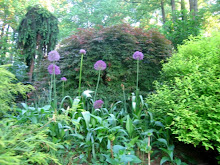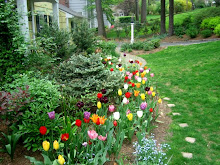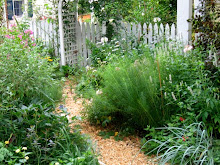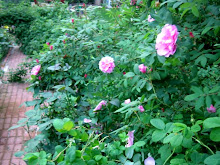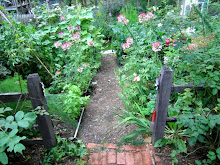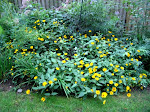Good news! The Sunday Farmers' Markets in Summit, New Jersey have been extended until the weekend before Christmas. I remember from last year that the number of shoppers dropped off significantly with the cold weather, so they didn't know if they were going to try to do it again this year. Alas, here's your opportunity to dress warmly and continue supporting the farmers. If enough people come out, maybe we can have a year-round farmers' market like they in other areas.
Welcome to Heirloom Gardener
Monday, November 16, 2009
NJ Farmers' Market Update: Sundays in Summit extended to Christmas
Posted by
Julia Erickson
at
6:00 AM
2
comments
![]()
![]()
Labels: Heirloom and Organic Food, New Jersey / Local Interest
Sunday, October 18, 2009
WSJ: Canning Makes A Combeack
Our vegetable garden isn't big enough to produces excess for canning, but the children do love making pickles from the cucumbers at the farmers' market. From Ana Campoy's article in The Wall Street Journal:
"The worst recession in decades and a trend toward healthier eating are inspiring many Americans to grow their own food. Now the harvest season is turning many of these gardeners into canners looking to stretch the bounty of the garden into the winter...
At Jarden Corp.'s Jarden Home Brands—the maker of Kerr and Ball brand jars—sales of canning equipment are up 30% this year through mid-September, over the same period in 2008. And canning classes from Brooklyn, N.Y., to Boise, Idaho, report seeing skyrocketing enrollments this year.
Canning has been around since the dawn of the 19th century, when, at Napoleon's behest, a Frenchman developed a method of sealing food in bottles to prevent spoilage on long military campaigns. The process was later adapted to factory-sealed metal cans, but at home, "canning" is still practiced in thick glass jars..."
Posted by
Julia Erickson
at
10:43 AM
2
comments
![]()
![]()
Labels: Heirloom and Organic Food
Thursday, September 17, 2009
Parsley Blooms in the Bird Garden
Posted by
Julia Erickson
at
6:00 PM
6
comments
![]()
![]()
Labels: Heirloom and Organic Food
Wednesday, August 26, 2009
This Cucumber Looks Like a Duck

Posted by
Julia Erickson
at
6:00 PM
6
comments
![]()
![]()
Labels: Heirloom and Organic Food
Monday, August 24, 2009
Some of This Year's Heirloom Tomatoes

Posted by
Julia Erickson
at
6:00 PM
9
comments
![]()
![]()
Labels: Heirloom and Organic Food
Saturday, July 18, 2009
Outbreak of Fungus Threatens Tomato Crop
From Julia Moskin in The New York Times:
"A highly contagious fungus that destroys tomato plants has quickly spread to nearly every state in the Northeast and the mid-Atlantic, and the weather over the next week may determine whether the outbreak abates or whether tomato crops are ruined, according to federal and state agriculture officials...
...Authorities recommend that home gardeners inspect their tomato plants for late blight signs, which include white, powdery spores; large olive green or brown spots on leaves; and brown or open lesions on the stems. Gardeners who find an affected plant should pull it, seal it in a plastic bag and throw it away, not compost it."
For the full article click, here.
Posted by
Julia Erickson
at
9:06 PM
6
comments
![]()
![]()
Labels: Heirloom and Organic Food, New Jersey / Local Interest
Friday, July 03, 2009
How to Protect the Vegetable Garden from the Groundhog, Part 3: New Eight Foot Tall Screens Around the Raised Beds
One of this season's projects has been to better protect the vegetable garden. As frequent readers of this blog know, enemy number one is the groundhog that lives next door in my neighbor's yard. The extra tall fence around my backyard keeps out the deer and my one year-old cat effectively deters most of the smaller pests--rabbits, squirrels and chipmunks. Unfortunately, I have been ineffective against the groundhog.
.
Part 1 of this year's project was to build a chicken wire fence cover over one of the raised beds with short vegetables. You can read about that here.
.
Part 2 of this year's project was to reinforce the open post and rail fence with chicken wire and build pest proof gates for the three openings. You can read about that here.
.
After parts 1 and 2 of this project, the first two months of the growing season were pest free with no break-ins from the groundhog. Then, last week, he broke in. I don't know how he did it, but he did. My poor beans and cucumbers were mowed down. He even had the audacity to push the chicken wire cover off just enough to squeeze in and help himself to some Russian kale. After having such a good start to the season, and seeing the damage he did in a single visit, I must confess that I thought of just giving up. My son responded with my own words: there is no giving up in gardening. I told my husband that he had to do something.
.
How to Protect the Vegetable Garden, Part 3
.
.
a. Buy eight foot 1x2s. We needed four 5'x8' screens for each raised bed, so my husband needed to buy thirty-two for the two raised beds we wanted to protect.
.
b. Cut your 1x2s to the desired length.
.
c. Nail your 1x2s together to make the frames of your screens. My husband put two 1 1/2 inch nails into each corner.
.
d. Cover your frames with deer fence netting. For such a large area, this is much lighter, cheaper and easier to work with than the chicken wire.
.
e. Nail two screens to the sides of your vegetable box where you need the least access.
.
f. Tie the other two screens to the fixed screens with rope that can easily be untied and re-tied for your access.
.
Hopefully, there will not be a Part 4 of this year's story.
Posted by
Julia Erickson
at
6:00 AM
2
comments
![]()
![]()
Labels: Gardening Tools and Structures, Heirloom and Organic Food, Pest Control
Tuesday, June 23, 2009
How to Protect the Vegetable Garden from the Groundhog, Part 2: Adding Chicken Wire and Gates to an Open Post and Rail Fence
When originally conceived, the Children's Garden was going to be a place to grow creative things with the children, like a tee pee made of vines, which we did the first year, and other beds planted and maintained by the children. Thus, the original fencing around the garden was a post and rail fence with three open entryways without gates, which you can see here. The only part of the garden remaining from that original conception is my older daughter's flower garden in the upper left hand corner. Over time, the children's interest in growing vegetables increased, so we replaced the short raised beds with extra-tall raised beds, which you can see and read about here. The extra-tall raised beds improved our vegetable production significantly, but as a result, we also attracted more pests, particularly those hungry, no-good rabbits and groundhogs.
 In the middle, you can see the simple wooden gate built to fit the space between the two posts. It is built with the same one by two's left-over from building the chicken wire raised bed cover. Because I wanted to keep pests from crawling under the gate, it is actually resting on the ground. Instead of hinges, it has long, easy, on-and-off ties on the top and bottom attached to each of the side posts.
In the middle, you can see the simple wooden gate built to fit the space between the two posts. It is built with the same one by two's left-over from building the chicken wire raised bed cover. Because I wanted to keep pests from crawling under the gate, it is actually resting on the ground. Instead of hinges, it has long, easy, on-and-off ties on the top and bottom attached to each of the side posts.*A Chicken Wire Raised Bed Cover
Posted by
Julia Erickson
at
10:07 PM
4
comments
![]()
![]()
Labels: Children's Garden, Gardening Tools and Structures, Heirloom and Organic Food, Pest Control
Saturday, May 30, 2009
Support Your Local Farmers: Chatham and Summit, New Jersey Farmers' Markets re-opening in June 2009
Summit Farmers' Market opens on Sundays starting on June 7th, 8AM-130PM:
http://www.summitdowntown.org/images/farmersmarket09.pdf
Chatham Farmers' Market opens on Saturdays starting on June 27th, 8AM-1PM:
http://www.chathamboroughfarmersmarket.org/
To find a farmers' market near you, type your zip code into the Local Harvest website:
http://www.localharvest.org/
Posted by
Julia Erickson
at
6:00 AM
0
comments
![]()
![]()
Labels: Heirloom and Organic Food, New Jersey / Local Interest
Friday, May 29, 2009
Organic Dairies Watch the Good Times Turn Bad
Another reminder to support your local and organic farmers, many of which are now going out of business or are at risk of doing so, from Katie Zezima in The New York Times:
"When Ken Preston went organic on his dairy farm here in 2005, he figured that doing so would guarantee him what had long been elusive: a stable, high price for the milk from his cows.
.
Sure enough, his income soared 20 percent, and he could finally afford a Chevy Silverado pickup to help out. The dairy conglomerate that distributed his milk wanted everything Mr. Preston could supply. Supermarket orders were skyrocketing.
.
But soon the price of organic feed shot up. Then the recession hit, and families looking to save on groceries found organic milk easy to do without. Ultimately the conglomerate, with a glut of product, said it would not renew his contract next month, leaving him with nowhere to sell his milk, a victim of trends that are crippling many organic dairy farmers from coast to coast."
.
For the full article, click here: http://www.nytimes.com/2009/05/29/us/29dairy.html
Posted by
Julia Erickson
at
9:00 PM
1 comments
![]()
![]()
Labels: Heirloom and Organic Food
Map of Michelle Obama's Kitchen Garden on the South Lawn of the White House
I found it interesting to look at a map of Michelle Obama's 1,100 square foot Kitchen Garden that was installed in March on the South Lawn of the White House:
http://www.whitehouse.gov/assets/documents/garden_layout.pdf
I have not seen is any mention of or credit assigned to who actually designed the garden, assuming that the First Lady did not do this herself.
Posted by
Julia Erickson
at
5:11 PM
1 comments
![]()
![]()
Labels: Heirloom and Organic Food
Tuesday, May 05, 2009
Spring Vegetables: Fresh Lettuce and Asparagus
As a follow-up to my March 24th post on cool season crops, the children started to harvest their first fresh vegetables this past week: loose leaf lettuces and asparagus. The fresh asparagus from the garden is especially delicious. I just wish we had more of it.
Posted by
Julia Erickson
at
11:43 PM
2
comments
![]()
![]()
Labels: Heirloom and Organic Food
Friday, April 17, 2009
More People Gardening, Canning, Sewing, and Focusing on Family in the Recession
Yes, the current economic crisis is awful, but here is some good news from Peggy Noonan's editorial in today's Wall Street Journal:
"A small sign of the times: USA Today this week ran an article about a Michigan family that, under financial pressure, decided to give up credit cards, satellite television, high-tech toys and restaurant dining, to live on a 40-acre farm and become more self-sufficient. The Wojtowicz family—36-year-old Patrick, his wife Melissa, 37, and their 15-year-old daughter Gabrielle—have become, in the words of reporter Judy Keen, "21st century homesteaders," raising pigs and chickens, planning a garden and installing a wood furnace.
Mr. Wojtowicz was a truck driver frustrated by long hauls that kept him away from his family, and worried about a shrinking salary. His wife was self-employed and worked at home. They worked hard and had things but, Mr. Wojtowicz said, there was a "void." "We started analyzing what it was that we were really missing. We were missing being around each other." ...
...The article offered data suggesting the Wojtowiczes are part of a recent trend. People are gardening more if you go by the sales of vegetable seeds and transplants, up 30% over last year at the country's largest seed company. Sales of canning and preserving products are also up. Companies that make sewing products say more people are learning to sew. I have a friend in Manhattan who took to surfing the Web over the past six months looking for small- and farm towns in which to live. The general manager of a national real-estate company told USA Today that more customers want to "live simply in a less-expensive place."
Posted by
Julia Erickson
at
10:56 PM
4
comments
![]()
![]()
Labels: Deep Thoughts About Gardening, Heirloom and Organic Food
Wednesday, April 08, 2009
The Planting Square for Seeds Revisited

Posted by
Julia Erickson
at
6:00 PM
4
comments
![]()
![]()
Labels: Gardening Tools and Structures, Heirloom and Organic Food
Sunday, March 29, 2009
How to Protect Vegetables from Groundhogs, Rabbits and Squirrels, Part 1: A Chicken Wire Raised Bed Cover

My friends over at Gardening Gone Wild asked me to write to you to discuss the status of our current dispute. While I have such a harmonious relationship with so much of the other wildlife in the garden--the birds, the toads, the salamanders--I regret that our relationship has become so acrimonious, particularly as it relates to the vegetables.
While I am flattered that you like the vegetables as much as (or perhaps even more than) we do, I find that your appetites leave something to be desired, namely leftovers. Last year, the garlic spray kept you away from many of the vegetables, but I was disappointed to still find teeth marks on my vine-ripened tomatoes and zucchinis, not to mention the fruitless pumpkin and watermelon vines whose flowers you devoured. I can no longer bear your rude interruptions.
Best wishes,
Heirloom Gardener
.
UPDATE: Part 2 of this series discusses adding chicken wire around the post and rail fence. Part 3 of this series discusses reinforcements to chicken wire raised bed cover after a break-in.
.
Related posts:
- Advice Wanted: How to Keep Rabbits Out of the Garden
- Keeping the Deer Out of the Backyard: the Deer Fence
- Keeping the Groundhog Out of the Cutting Garden
- Organic Pest and Fungus Control: Garlic Barrier - Yes, It Really Works
- Organic Rose Gardening: Dormant Oil Application for Pest Control
- Organic Pest Control: Colorado Potato, Threelined Potato, and Japanese Beetles
Posted by
Julia Erickson
at
10:55 AM
11
comments
![]()
![]()
Labels: Garden Bloggers' Design Workshop, Gardening Tools and Structures, Heirloom and Organic Food, Pest Control
Tuesday, March 24, 2009
Planting Early Spring Cool Season Crops and Vegetable Gardening 101
Last week, I turned over the cover crops in my raised vegetable beds. Having let the soil rest for a week, I am now ready to plant my first cool season crops: loose leaf lettuces, shelling peas, and sugar snap peas. I am planting all of them from seeds purchased from Baker Creek Heirloom Seeds.
The lettuce seeds need some light to germinate, so all you have to do is press them into the soil. The pea seeds are planted at a depth twice the length of the seed which is easy to do by simply poking your finger into the soil. From here, you don't really water them. You just mist them enough so that they stay slightly moist and don't dry out. How frequently you do this depends upon the weather.
Vegetable Gardening 101: Tips from a Beginning Heirloom Vegetable Gardener
- How to Build Raised Beds (on a Slope/Hill)
- Organically Preparing the Soil for Planting
- Farmer's Almanac Spring Planting Schedule (March/April) and Heirloom Seed Sources
- Farmer's Almanac Spring Planting Schedule (May)
- How to Make the Perfect Soil Mix for Seed Sowing
- Baker Creek Heirloom Seeds - the best heirloom seed offerings
- How to Build a Planting Grid for Square Foot Gardening
- How to Make a Planting Square to Uniformly Space Your Seeds
- Five Tips for Growing Edibles with Children
- How to Plant Corn the Way Squanto Taught the Pilgrims
- How to Plant Potatoes and Harvesting Asparagus
Posted by
Julia Erickson
at
8:55 PM
0
comments
![]()
![]()
Labels: Heirloom and Organic Food
Thursday, March 19, 2009
How to Build a Planting Grid for Square Foot Gardening

~
1. Gather together your materials and tools: 6 four foot wood lathes for each 4x4 foot grid you want to make; nuts and bolts to hold your grid in place; tape measure and pencil; and power drill.
~
2. Measure and mark your wood lathes in one foot increments.
~
3. Pre-drill the holes in your wood lathes at each one foot increment. Pre-drilling is important as the wood lathe would likely break without doing so.
~
4. Screw in your nuts and bolts to hold together your grid. At this step, I found that I actually needed to re-drill some of the holes, as my wood lathes were not all perfectly straight.
~
Posted by
Julia Erickson
at
9:27 PM
2
comments
![]()
![]()
Wednesday, January 07, 2009
Baker Creek Heirloom Seeds: the best heirloom seed offerings I've seen anywhere
I recently received my Baker Creek Heirloom Seeds catalog. I love it. The whole thing deserves a cover to cover read. The heirloom seed offerings are phenomenal--the best I've seen anywhere. The descriptions and histories of the various seeds are interesting and illuminating. For instance, I'd never heard of some of the cucumbers offered, particularly those from India. There are cucumbers in many colors: white, yellow, green, and even brown.
~
The seed selection is vast and diverse. They have so many of my favorite black and green tomatoes that I was out in the garden looking for more places to grow tomatoes. The catalog notes that Baker Creek offers more melons than any other catalog. I was happy to find a 60 day maturing watermelon. Also, you will not find any GMOs in this catalog, not even GMO corn.
~
The story of Baker Creek and the company's aims are also to be applauded. It is a family owned business from Missouri (my home state) which has been able to grow every year in size and offerings. In the back of the catalog is a reprint of an article about the founder, Jeremiath Gettle. I love the story of how his love of heirloom vegetables and seed saving has grown into a thriving business. This is truly a story of how following you passion can reap vast personal rewards.
~
In addition to offering seeds for sale, Baker Creek also publishes a magazine (with a great name) "The Heirloom Gardener;" has a poultry farm for historic, rare breed chickens; and hosts several festivals at Bakersville, the historical village they are creating.
~
For more information, check out their websites:
http://rareseeds.com/
http://heirloomseedsmen.com/
http://theheirloomgardener.com/ (no relation to this blog)
Posted by
Julia Erickson
at
4:57 PM
10
comments
![]()
![]()
Labels: Heirloom and Organic Food, Nurseries
Government Gone Wild: Proposed Greenhouse Gas Emissions Tax on Cows and Other Livestock
From the New York Times: The E.P.A. indeed issued an “advanced notice of proposed rulemaking” this summer that called for public comments on the idea of regulating greenhouse gas emissions from cars, as well as “stationary sources” — which, yes, would include cows and other livestock. For the full article, click here.
Posted by
Julia Erickson
at
8:27 AM
2
comments
![]()
![]()
Labels: Heirloom and Organic Food
Friday, November 28, 2008
After the Frost: Thai Basil
Posted by
Julia Erickson
at
11:56 AM
1 comments
![]()
![]()
Labels: Heirloom and Organic Food
Search Heirloom Gardener
Labels
- About Blogging
- Annuals/Biennials and Perennials
- Autumn Garden
- Books and Movies
- Botanical Gardens
- Bulbs and Tubers
- Children's Garden
- Chrysanthemum
- Clematis
- Container Gardening
- Crocus tommasiniasus roseus
- Cut and Forced Flowers
- Cutting and Rose Gardens
- Dahlias
- Deep Thoughts About Gardening
- Egg Garden
- Fences Arbors Walls and Paths
- Floral arrangements
- Front Border
- Fun Stories About Gardening
- Garden Bloggers' Bloom Day
- Garden Bloggers' Design Workshop
- Garden Planning
- Gardening Blogs
- Gardening Tools and Structures
- Gardening with Children
- Goldberry Hill
- Heirloom and Organic Food
- Hibiscus
- Holidays
- Hydrangeas
- Japanese Beautyberry
- Lilies
- Mixed Borders
- New Jersey / Local Interest
- Nurseries
- Online Gardening Resources
- Peonies
- Pest Control
- Picture This Photo Contest
- Piet Oudolf
- Poppies
- Propagation and Seeds
- Pruning and Maintenance
- Roses
- Seed Heads
- Self Seeders
- Shrubs
- Spring Garden
- Summer Garden
- Trees
- Wildlife in the Garden
- Winter Garden
- Zinia












